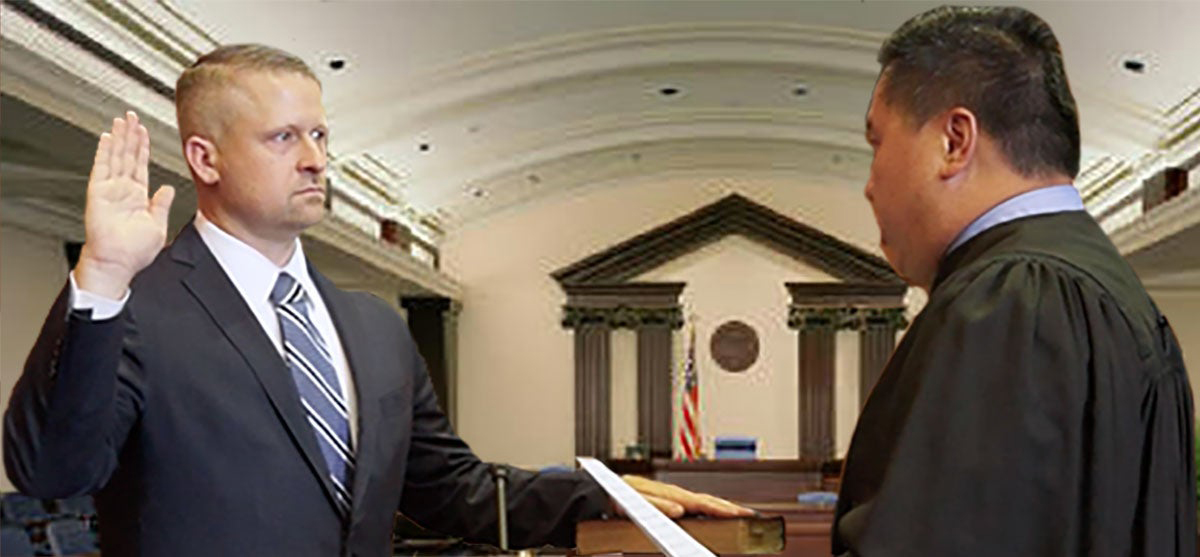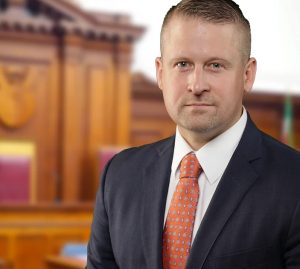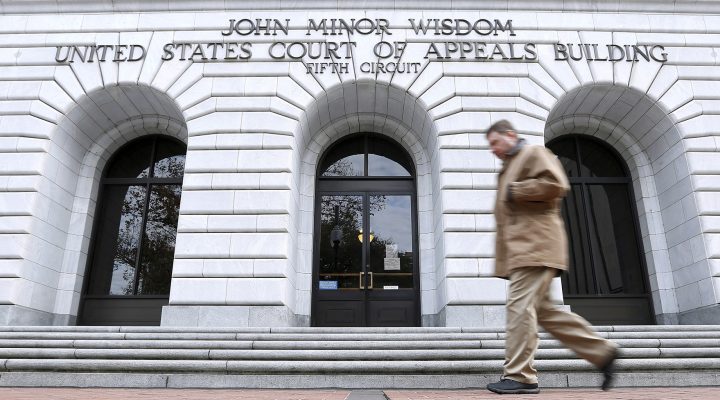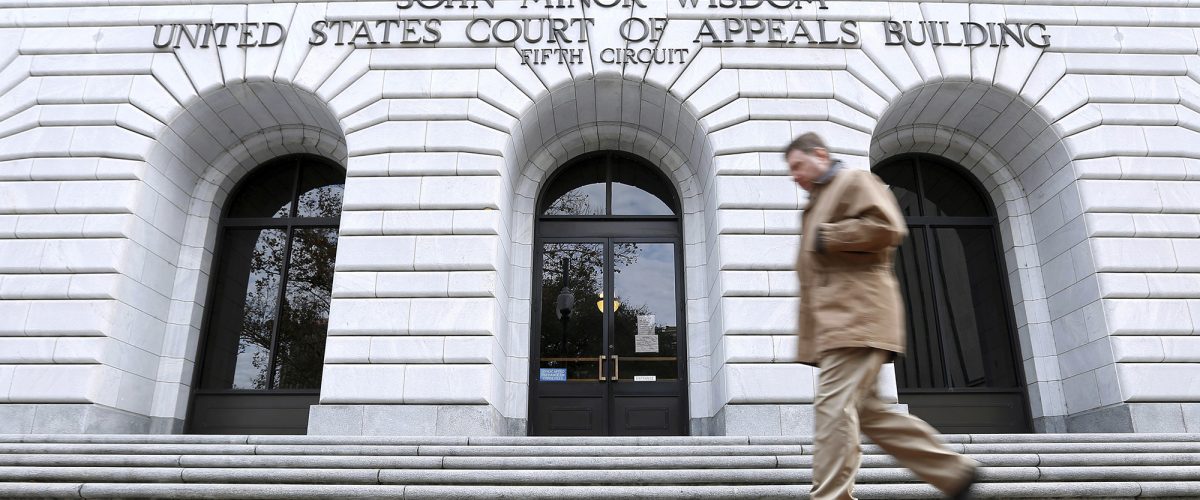On March 12, the Fifth U.S. Circuit Court of Appeals upheld a lower court ruling that gave a Texas father the right to deny his daughters access to birth control made available through the federal government’s Title X free contraception program.

Alex Deanda (Photo: Conservatives of Texas website)
Alex Deanda believes Title X “facilitate(s) sexual promiscuity and pre-marital sex” and interferes with his right to raise his daughters “in accordance with Christian teaching on matters of sexuality, which requires unmarried children to practice abstinence.”
Deanda v. Becerra, like many other cases brought by conservative Christian plaintiffs in the name of religious freedom, is part of a strategic campaign to advance Christian nationalism by means of the judiciary.
Title X provides family planning services including birth control, pregnancy testing, cancer screenings, HIV and STI testing and treatment to low-income Americans, including teenagers. Passed with bipartisan support and signed into law by President Richard Nixon in 1970, Title X is administered by the U.S. Department of Health and Human Services Office of Population Affairs, which provides grants to 3,500 clinical sites, including public health departments and nonprofit health centers. Every Body Texas is the Title X facilitator for family planning in Texas and distributes federal funds to 156 clinics across the state.
Title X encourages parental involvement but does not require parental consent for teens to access birth control. Texas, however, has a state law that mandates parental permission, and the conflict between the two laws is at the heart of Deanda v. Becerra.
“Normally, a federal law would supersede a state law, but conservatives looking to restrict birth control aren’t concerned with legal precedent.”
Normally, a federal law would supersede a state law, but conservatives looking to restrict birth control aren’t concerned with legal precedent. Because they don’t have the votes necessary to pass laws on a national scale, Christian conservatives are relying on likeminded judges to undermine federal law at the state level.
Shopping for judges
To tear down Title X, conservatives followed a tried-and-true playbook: find or manufacture a potential case within the jurisdiction of a sympathetic federal judge. The plaintiff in Deanda v. Becerra is Alexander Deanda, an Amarillo native and precinct chair for the Republican Party in Randall County. He also heads the group Conservatives of Texas established in 2019 as a “grassroots effort to embrace conservatism and American exceptionalism.”
As such, he interviews local politicians on YouTube and hosts strategy sessions with a pal of My Pillow magnate Mike Lindell. Deanda also is a member of Accelerate Church in Amarillo, part of televangelist Mark Barclay’s Righteous Preacher Network and a church that a Canadian judge officially cited in 2023 for shielding a Canadian pastor accused of sex crimes.
In 2020, Deanda filed his lawsuit in Amarillo — backed by the conservative legal aid group Alliance Defending Freedom — against the Department of Health and Human Services, represented now by Secretary Xavier Becerra. In the suit, Deanda accuses Title X of “weakening his ability to raise his children under the teachings of his Christian faith” because they would have access to prescription contraception that “facilitate(s) sexual promiscuity and premarital sex.”

Matthew Kacsmaryk being sworn to service as a federal judge by Judge James C. Ho of the Fifth Circuit U.S. Court of Appeals.
Does he have standing?
Deanda has an adult son from a premarital relationship of his own, and three daughters from his current marriage, two of whom were legal adults by the time the case reached the appeals court. The third is a high school junior. Deanda admitted none of his daughters had ever received birth control from a Title X clinic.
Something similar happened in the 2023 Supreme Court case 303 Creative v. Elenis, when justices ruled a Christian graphic designer, also represented by lawyers from ADF, did not have to create wedding websites for a gay couple. The designer, Lorie Smith, was not designing websites at the time and no same-sex couple had asked her to create one. However, the fact that she might be asked to design such a website was deemed threat enough to her religious rights by the justices.
Had Deanda lived in another district, a judge might well have dismissed his case for lack of legal standing because no one in his family has been harmed by Title X’s confidentiality mandate. However, U.S. District Judge Matthew Kacsmaryk also is a conservative Christian, and under his leadership the Amarillo division of the Northern District of Texas has become the “go-to-place” for far-right Republicans who want to challenge the federal government.
Kacsmaryk is the lone judge in Amarillo, so plaintiffs seeking a favorable conservative ruling are better off filing a lawsuit in his division than in Dallas or Austin.
He agreed with Deanda that Title X clinics pose “an ongoing continuous and imminent risk” to Christian parents and ruled that the state law was not in conflict with the federal law. Kacsmaryk referenced religious sources in his written opinion, including Catholic catechisms and a fourth century text by Jerome.
“We’ve seen religious arguments that increasingly come into the courts dressed up as legal arguments,” said Elizabeth Sepper, a law professor at the University of Texas in Austin. The Alabama judge who recently ruled frozen embryos were children cited Medieval theologian Thomas Aquinas.
Who is Matthew Kacsmaryk?
As a litigator at First Liberty Institute, Kacsmaryk made a name for himself fighting against same-sex marriage, LGBTQ anti-discrimination protections, abortion rights and birth control. He said women’s reproductive rights stem from a “radical” and “libertine” sexual revolution which he likened to the French Revolution for its capacity to destroy. In 2015, he filed an amicus brief opposing a state law in Washington that requires pharmacies to provide an assortment of medications, including contraception.

Matthew Kacsmaryk (Photo: First Liberty Institute)
A Trump appointee, Kacsmaryk gained notoriety recently for ruling in favor of ADF lawyers and banning the abortion pill mifepristone, which he said is used to “kill unborn humans.” Mifepristone combined with misoprostol was used in 63% of abortions from 2020-2023 in the United States. The Biden administration appealed Kacsmaryk’s ruling, and the Supreme Court heard the case March 26.
As expected, the administration also appealed the Kacsmaryk ruling in Deanda v. Becerra, and the case moved on to the Fifth U.S. Circuit Court of Appeals in New Orleans. This appeals court covering Louisiana, Mississippi and Texas is regarded as the most conservative court in the country. Judges in the Fifth Circuit sided with Navy SEALs who refused COVID vaccines over “religious liberty,” ruled the Consumer Financial Protection Bureau unconstitutional, and upheld Kacsmaryk’s ruling against mifepristone. To make such right-wing rulings possible, the Fifth Circuit entertains experimental legal arguments that wouldn’t hold up in most other courtrooms.
Meet Jonathan Mitchell
Making those arguments on behalf of Deanda at the court was his lawyer, Jonathan Mitchell. Mitchell most recently represented Donald Trump in his suit to remain on the primary ballot in Colorado, but he is better known for his legal machinations against abortion and birth control. He once served as Texas’ solicitor general from 2010 to 2015 and, in that role, upheld a law requiring a sonogram 24 hours before an abortion, removed 50,000 low-income Planned Parenthood patients from Medicaid, and supported a restrictive abortion law that temporarily closed half the clinics in the state.
In 2020, Mitchell revealed his disdain for women in a legal brief filed for a client challenging the Affordable Care Act’s birth control requirement in which he said, “Contraception and sterilization are simply devices that enable women who do not wish to become pregnant — but who are unwilling to refrain from sexual intercourse — to engage in sexual intercourse while greatly reducing their risk of pregnancy.”
“Mitchell’s anti-abortion masterpiece was a legislative one, Texas Senate Bill 8.”
As onerous as his legal actions were, Mitchell’s anti-abortion masterpiece was a legislative one, Texas Senate Bill 8.
In 2019, East Texas pastor Mark Lee Dickson wanted to create a “sanctuary city for the unborn” to prevent abortions in his small town, even though no abortion providers were located there at the time. Through a novel legal theory, which he calls the “Writ-of-Erasure Fallacy,” Mitchell devised a strategy to make abortion illegal in Texas while Roe v. Wade was still the law of the land. Mitchell argued that the Supreme Court’s rulings don’t invalidate state law, upending the tradition of judicial review. Under his theory, a pre-Roe law like one in Texas outlawing abortion, remains on the books unless rescinded by the state Legislature. All that is needed, according to Mitchell, is to tweak the original law to allow private individuals to enforce it. With this modification, people seeking abortions and the clinics that offer them are left without a government entity to sue for access.

Jonathan Mitchell
Texas SB-8, the Texas Heartbeat Act, is a six-week abortion ban that permits Texans to prosecute anyone who helps someone obtain an abortion. If these “abortion bounty hunters” are successful, the courts award them $10,000. The law has been challenged in several court cases but upheld by the Fifth Circuit.
In November 2023, the same month as his appeal before the Fifth Circuit, Deanda interviewed Dickson on his YouTube channel and the next month joined a group of citizens filing paperwork to make Amarillo a sanctuary city. Dickson may have been the catalyst to connect Mitchell and Deanda or it could have been the ADF who began paying Mitchell’s law firm in 2019 for his work on “religious freedom.”
“It may be that the day will come when people say the birth-control pill was a mistake.”
ADF also filed an amicus brief in support of Deanda. CEO Alan Sears said after the Fifth Circuit decision, “We are on a winning trajectory. It may be that the day will come when people say the birth-control pill was a mistake.”
A three-judge panel from the Fifth Circuit upheld the Amarillo court’s original decision and determined the Texas law did not conflict with the federal law but rather complimented it.
A 1981 amendment to Title X reads, “To the extent practical, grantees shall encourage family participation,” with the understanding that such oversight is not always possible, therefore minors must be assured confidentiality. The justices ignored this long-held interpretation and ruled the amendment was just the “floor” for involvement, and the Texas law requiring parental notification was a version of “family participation.”
Like Kacsmaryk, they also agreed Deanda had legal standing to bring the suit even though he had suffered no harm.
Judge Stuart Kyle Duncan, who wrote the opinion for the panel, openly criticized Title X by saying, “A key goal of the secretary’s policy is to get contraceptives into children’s hands without their parents knowing. Parents’ standing to sue should not depend on whether the secretary has successfully kept them in the dark about their children’s sex lives.”
While Duncan asserted parents had rights in the realm of contraception, he made a point of clarifying that such rights do not extend to accessing transgender health care banned in Kentucky and Tennessee.
Back to Hobby Lobby
The Fifth Circuit ruling was not Duncan’s first contraception case. Before he was nominated to the court by Donald Trump in 2018, Duncan was an attorney with the Becket Fund for Religious Liberty, where he successfully represented David Green and family before the Supreme Court in Burwell v. Hobby Lobby Stores Inc. The 2014 lawsuit challenged the ACA’s birth control mandate for employer-sponsored health insurance.
The Greens, who own Hobby Lobby, believe certain birth control pills, along with IUDs and the morning-after pill, are all abortifacients and as such violate their religious beliefs. Their beliefs are ill-informed and, in the case of IUDs and Plan B, scientifically wrong; but what mattered in their case against the ACA was not the facts, but the Greens’ feelings.
“The believer’s conscience cries out for protection,” Duncan wrote in a 2013 article for First Things. As for those in need of birth control, at an Americans United for Life event Duncan called their idea of a “right” to contraception “disturbing.”
It came as little surprise then that Duncan, who also has taken aggressive legal stands against abortion, same-sex marriage and trans people, ruled in favor of Deanda and the conservative Texas law requiring parental consent for teens to access birth control. The ADF and other conservative religious groups were banking on it from the moment Deanda filed his lawsuit in Amarillo.
Meanwhile, back in Texas …
Every Body Texas is currently requiring clinics to seek parental permission before distributing contraception while administrators wait to see if the federal government will appeal the case to the U.S. Supreme Court. Texas has one of the highest rates of teen pregnancy in the nation and the highest rate of repeat teen pregnancy, which makes limiting access to contraception all the more problematic.
Parents like Deanda, who regularly attend church, are “more likely to underestimate their teen’s risk-taking behavior in terms of sex” according to Stephen Griffin at Texas Tech University.
“What the Deanda case failed to consider are teens who might need birth control for medical reasons.”
What the Deanda case failed to consider are teens who might need birth control for medical reasons. “We can’t even provide contraception for a gynecological issue,” said Carolena Cogdill, CEO of Haven Health, a family planning clinic serving English- and Spanish-speaking patients. “We had a young lady come in who had abnormal bleeding, and we wanted to prescribe contraception to help control that bleeding. And we couldn’t do it because she was 16. The patient had said her mother would not understand.”
The perils of appeal
If the Biden administration wishes to appeal the Fifth Circuit’s ruling, the case would move on to the Supreme Court, where conservatives on the bench could imperil access to birth control for teens nationwide.
Part of Deanda’s case rests on the “due process clause” of the Fourteenth Amendment, which his lawyers assert gives parents the right to raise their children as they see fit, including according to conservative Christian values. However, in the 1977 Supreme Court case Carey v. Population Services International, a plurality of justices determined that same clause gives teens the right to privacy when it comes to decisions about contraception.
But even with that precedent-setting Supreme Court ruling, given the current court’s decisions in the Hobby Lobby and 303 Creative cases, an appeal is not without risk. “I think we’re seeing a movement that began with a religious exemption, saying, ‘Let me structure my health care to suit my morals,’ and we’re moving toward an agenda that says, ‘Let me structure all of health care according to my morals,’” Sepper said.
Judicial activists like Kacsmaryk and Duncan, and lawyers like Jonathan Mitchell and those at the ADF, are after more than parental permission for contraception.
In an interview with the Federalist Society, Mitchell confessed his plan for imposing conservative values on the country: “What we have to do is flood the courts with lawsuits so some of these cases go trickling up to the Supreme Court.”
“What we have to do is flood the courts with lawsuits so some of these cases go trickling up to the Supreme Court.”
The assumption behind this strategy is that the court that overturned Roe v. Wade might well do the same with other past rulings or leave matters up to individual states. Justice Clarence Thomas said in his concurring opinion in Dobbs v. Jackson Women’s Health Organization that indeed the court should reconsider all rulings that aren’t “deeply rooted in our nation’s history and tradition.” He included among them Obergefell v. Hodges which allowed for gay marriage, and Griswold v. Connecticut (a ruling he called “erroneous”) that granted married people legal access to birth control.
Next up: Exclusionary Rule
Next in Mitchell’s “crosshairs” is the Exclusionary Rule from the Fourth Amendment, which protects citizens from unreasonable search and seizure and prosecution from evidence found in such cases.
Mitchell was narrowly denied a position in the Trump administration. Should there be a second, who knows what might happen if police or even private citizens were given free rein to obtain evidence with no warrant — especially if laws regarding birth control, medication abortion or same-sex marriage are permanently reversed.
He says he thinks there are currently five votes on the Supreme Court willing to overturn the Exclusionary Rule, “if we get the proper case to them.”
Duncan and Kacsmaryk, who both have been short listed for the Supreme Court by conservatives, might join them if Trump has the chance to appoint more justices.
Texas has become a pipeline for right-wing legal decisions. Deanda v. Becerra is just the latest case engineered by conservative backers and run through a court system stacked with sympathetic judges willing to legislate from the bench to impose their bigoted interpretation of Christianity on the country.
Unfortunately, with Trump-appointed judges presiding at every level of the judiciary, this machine may just be getting warmed up.
Kristen Thomason is a freelance writer with a background in media studies and production. She has worked with national and international religious organizations and for public television. Currently based in Scotland, she has organized worship arts at churches in Metro D.C. and Toronto. In addition to writing for Baptist News Global, Kristen blogs on matters of faith and social justice at viaexmachina.com.
Related articles:
Life post-Roe: Is there middle ground between religious liberty and medical freedom? | Analysis by Mallory Challis
Author of Texas abortion bill is shocked its vague language is confusing


